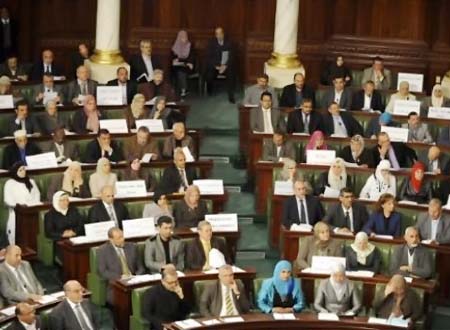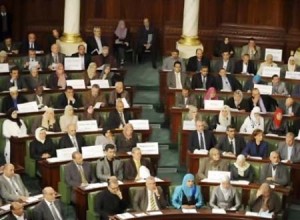As Tunisia’s Constituent Assembly prepares to review a draft Constitution in the coming days, the International Freedom of Expression Exchange Tunisia Monitoring Group (IFEX-TMG), a coalition of 21 IFEX members, expresses its concern about a draft proposal to regulate the media. The IFEX-TMG considers that the references to media regulation in the draft Constitution are not in compliance with Tunisia’s international obligations to respect, protect and promote freedom of expression and media freedom.
The Special Draft Chapter on media regulation creates the structure of a centralised regulatory body with a wide range of duties and unlimited power and control over all media, which violates the basic principles of democracy. The proposed draft lacks sufficient safeguards for media freedom and was drafted without public debate.
The IFEX-TMG calls on the Committee that authored the draft to recall it and subject it to a public debate. It also urges the Tunisian government and Constituent Assembly to take all necessary steps to implement Decree 2011-116, adopted on 2 November, 2011, which laid the groundwork for a newly independent broadcast media with the creation of the Independent High Authority for Audiovisual Communications (HAICA).
Media professionals open to persecution and censorship
The IFEX-TMG is alarmed that the National Constituent Assembly’s draft articles related to media freedom and freedom of expression lack the clarity of language that as a consequence opens them up to vague interpretation. The draft constitution also ignores the demands of journalists and media professionals who fear they may be persecuted as a result of what they publish. According to information gathered by the IFEX-TMG, the Rights, Freedom and Duties Committee within the Constitutional Assembly suggested 38 articles; four of them have been written already and the rest have yet to be dealt with.
Article 9 states that “Freedom of expression is guaranteed in the forms of speaking, writing, photographing and any other form of publication.” Local partners assert that the language is ambiguous and that the initiators should have clearly stated that freedom of expression is guaranteed in all forms of publication, without reservations.
While Article 10 states that media freedom is guaranteed and censorship over the press has been lifted, Article 21 states that journalists are liable to be detained if they defame or attack persons or call for violence or discrimination. Criminal defamation cases could continue to be lodged with the resurgence of moralising censorship and an ensuing climate of legal uncertainty, in which the courts have continued prosecuting journalists using the 1975 Press and Criminal Codes.
In addition, this proposal comes at a time when a draft law to criminalise offenses against “sacred values” was proposed by Ennahdha in the National Constituent Assembly. The bill, put forth on 1 August 2012, would allow prison terms and fines for those convicted of insulting or mocking the “sanctity of religion.”
entralised regulatory control with unlimited powers
The IFEX-TMG is also concerned with the Chapter suggesting the entire information sector should be under the centralised control of a single regulatory body. This structure of information control is incompatible with the basic principles of democracy. The media, telecommunications and postal sectors should be regulated by separate bodies with different powers and duties, without the intervention of the government.
The government has failed to provide the legal framework for broadcasting licensing, spectrum assignment and media diversity and pluralism. It has also failed to establish the promised HAICA, which was designed to strengthen democracy.
However, the press should be self-regulated by independent, voluntary press councils established by print media outlets themselves, whose members would be elected from among major stakeholders such as journalists, media owners, publishers and representatives of civil society. Furthermore, the proposed regulatory body would have a wide range of duties and potentially unlimited powers, as the Chapter fails to specify its limitations.
Finally, while Article 20 of the Special Draft Chapter on media regulation, guarantees access to information, it excludes information that “affects Military Security,” effectively permitting the army to take a role in imposing censorship.
IFEX-TMG members reiterate their concerns that freedom of expression must be fully protected in the new Constitution, and there must be no caveats that can drag Tunisia backwards. In July, the IFEX-TMG issued a report with a full set of recommendations on freedom of expression, freedom of association and the independence of the judiciary. See: Spring into Winter? Fragile achievements and exceptional challenges for Tunisian free expression defenders.
The IFEX-TMG calls on the Tunisian authorities and the Constitutional Assembly to:
- Guarantee in the Constitution freedom of expression, media independence and access to information, including online, and guarantee the independence of public service media.
- Re-adopt Decree 2011-115 (also known as the new Press Code) which guarantees the protection of journalists from harassment and abolishes prison sentences for criminal defamation and a number of other speech offences; which would therefore mean Decree 115 supersedes any previous and relevant provisions or laws, especially the 1975 Press Code.
- Re-adopt Decree 2011-116, which laid the ground for a newly independent broadcast media with the creation of the Independent High Authority for Audiovisual Communications (HAICA).
- Recall the Draft media regulation and initiate more comprehensive media reform to bring Tunisia fully in line with its obligations under international human rights law.
- Fully involve public bodies and civil society organisations as members of the regulatory body to represent the full spectrum of society.
- IFEX Tunisia Monitoring Group
- Arabic Network for Human Rights Information
- ARTICLE 19
- Bahrain Center for Human Rights
- Cairo Institute for Human Rights Studies
- Canadian Journalists for Free Expression
- Cartoonists Rights Network International
- Egyptian Organization for Human Rights
- Freedom House
- Index on Censorship
- International Federation of Journalists
- International Federation of Library Associations and Institutions
- International Press Institute
- International Publishers Association
- Journaliste en danger
- Maharat Foundation
- Media Institute of Southern Africa
- Norwegian PEN
- World Association of Community Radio Broadcasters – AMARC
- World Association of Newspapers and News Publishers
- World Press Freedom Committee
- Writers in Prison Committee, PEN International
Share this Post


